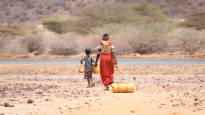Human activity has disrupted the water cycle, and climate change is exacerbating the problems.
The United Nations is organizing this week conference on the global water crisis (you go to another service), which has received little attention in the organization. There is no international agreement on the use of water resources and it does not have its own agency in the UN. The last high-level UN meeting on the subject was held in 1997 in Argentina.
Potable water is unevenly distributed on the planet. Countries like Finland have plenty of water, but in many countries there is a shortage of water and the water resources in use are polluted. The conference has been convened by the Netherlands and Tajikistan.
– Now or never, as they say, this is a once-in-a-generation opportunity, says the Dutch special envoy for water affairs to AFP Henk Ovink.
According to Ovink, man has disrupted the planet’s natural water cycle.
– We take too much water from the soil and pollute the water that is left, says Ovink.
One suffers from drought, the other from floods
The three-day UN event will be held in New York, USA, from Wednesday to Friday. The organizers hope the event will be a “Paris moment” for water use, a reference to the Paris Climate Agreement, where countries agree to limit global warming.
Disturbances in the water cycle have been seen as an increase in extremes in the water situation of different countries. In one place we suffer from withering drought and in another from devastating floods. It is thought that extreme weather phenomena will only increase with climate change.
According to UN estimates, 2.3 billion people live in countries that suffer from some degree of water scarcity. In 2020, two billion people suffered from a lack of drinking water and 3.6 billion did not have a toilet at home. 2.3 billion did not have opportunities to wash their hands at home, leading to the spread of disease.
The numbers speak harshly that the UN is failing in its sustainable development goal, according to which water access should be secured for all people by 2030.
